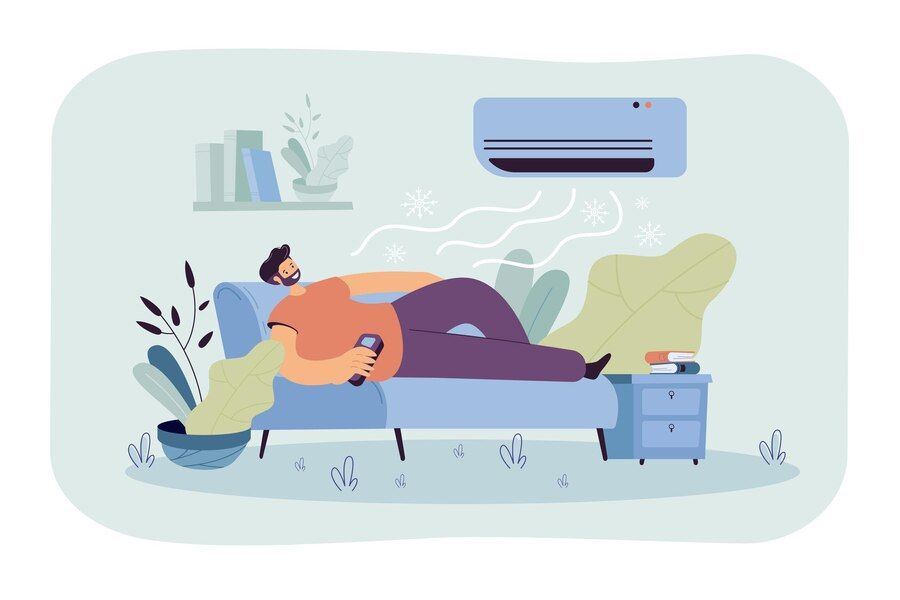
Get A Quote
Which Is Better: Fan or Air Conditioner?
In this comprehensive guide, we'll unravel the differences between these two cooling options, delve into the pros and cons of electric fans and air conditioners, address the electricity consumption dilemma, and finally, attempt to answer the burning question: which is better: fan or air conditioner?
 Difference Between a Fan and an Air Conditioner
Difference Between a Fan and an Air Conditioner
The differences between fans and air conditioners encompass considerations of health impacts, noise levels and cooling efficiency. Here are the details:
1. Health Considerations:
- Fans circulate natural air, which is generally healthier than the cold air generated by air conditioners.
- Air conditioners extract moisture from the air, leading to decreased humidity, dry air, and potential health issues such as sinus irritation and skin dehydration.
2. Sound:
- Fans are generally quieter than air conditioners, providing a peaceful and distraction-free cooling experience.
- The balanced design of fans allows for silent operation, contributing to a more comfortable environment.
3. Cooling Efficiency:
- Fans don't change the temperature of the air but create an artificial breeze that evaporates moisture from the skin, providing a cooling sensation.
- Air conditioners are best reserved for extremely hot days, as they actively cool the air and are more effective in severe heat conditions.
Pros and Cons of Electric Fans
Electric fans, with their simplicity and affordability, have been a household cooling choice for generations. The pros of fans include energy efficiency, low operating costs, and ease of use. Fans are also versatile; they come in various styles, from ceiling fans to oscillating pedestal fans. They are an excellent choice for maintaining a consistent airflow, preventing stuffiness, and providing a more comfortable environment. However, fans have their cons too. While they do circulate air effectively, they don't actually cool the air. They merely create the sensation of cooling through evaporation. This means they might not be the best choice during a sweltering heatwave when the air is oppressively hot.
Pros and Cons of Air Conditioners
Now, let's shift our attention to air conditioners. The pros of AC units are hard to ignore. They have the power to bring down the temperature significantly, making them a go-to solution in extreme heat. Air conditioners also excel at dehumidifying the air, providing relief in humid climates. Modern units come with advanced features like programmable thermostats, air purifiers, and energy-efficient options, making them a comprehensive solution for home comfort. However, the cons of air conditioning are worth considering. They tend to be more expensive both upfront and in terms of operational costs. Installation can be a bit complex, and regular maintenance is crucial for optimal performance. Moreover, some people find the cold, artificial air produced by ACs less appealing than the natural breeze from a fan.
 Do Fans Use More Electricity than Air Conditioning?
Do Fans Use More Electricity than Air Conditioning?
In the cooling battle between fans and air conditioners, the numbers speak volumes. Fans, with their simple design and circulation-oriented function, are energy-efficient. The electricity they consume, dictated by size and speed, is notably lower than that of air conditioners. A typical ceiling fan, according to the U.S. Department of Energy, uses about 75 watts on high speed, while a floor or table fan uses around 100 watts.
On the other hand, air conditioners, complex with their refrigerant cycle, cool and dehumidify air at a higher energy cost. The size, efficiency, and type of air conditioner impact its electricity consumption. A typical window unit uses approximately 900 watts, while a central air conditioner averages about 3500 watts.
When it comes to costs, running an air conditioner significantly outweighs running a fan. For instance, running a window air conditioner for eight hours a day for 30 days in July could cost around 25.92 dollars, while a central air conditioner for the same duration could cost around 100.8 dollars. In contrast, running a ceiling fan or a floor/table fan for the same duration would cost only about 2.16 dollars and 2.88 dollars, respectively.
These estimates highlight that fans are not only a budget-friendly choice but also a more energy-efficient option compared to air conditioners, making them an appealing solution for staying cool in the summer.
Which Is Better: Fan or Air Conditioner?
The million-dollar question: which cooling solution reigns supreme? The answer depends on various factors, including personal preferences, budget, and the climate you live in. For those who value simplicity, cost-effectiveness, and energy efficiency, a fan might be the perfect companion. It's an excellent choice for moderate temperatures and provides continuous airflow without breaking the bank. On the other hand, if you reside in an area with scorching summers and high humidity levels, and you crave the luxury of a chilly indoor oasis, an air conditioner might be your best bet. The upfront cost and higher electricity usage are trade-offs for the unparalleled cooling and dehumidifying benefits an AC unit offers.
Conclusion
The decision between a fan and an air conditioner boils down to personal preferences, budget considerations, and local climate. Whether you favor the continuous airflow of a fan or the intense chill of an air conditioner, the choice is yours to find your perfect cool. Stay cool with CROSSBOW — where comfort meets cutting-edge technology.
